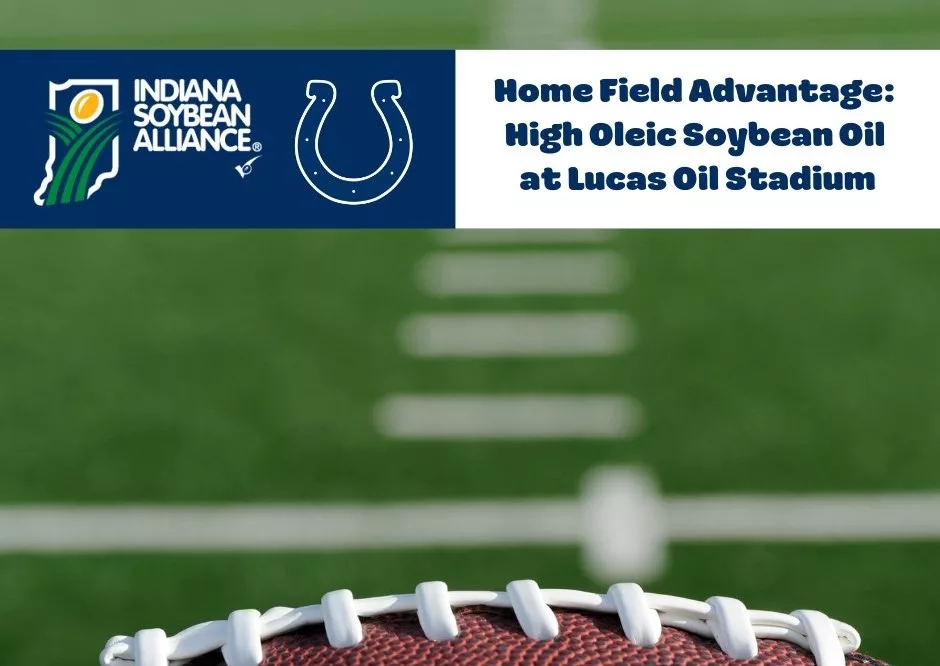For sports fans in Indiana, October is a special time of year. The Indianapolis Colts are tackling the middle of their NFL season at Lucas Oil Stadium. The Indiana Pacers tip-off their NBA schedule with home games at Gainbridge Fieldhouse.
Those who prefer college sports will cheer at both football and basketball games in Purdue University’s Ross-Ade Stadium and Mackey Arena, and Indiana University’s Memorial Stadium and Simon Skjodt Assembly Hall. October is also the start of professional hockey season, and the Indy Fuel will start its 2024-25 season in the brand new Fishers Event Center.
Each of these sports and teams feature special athletes who are a cut above the rest. These are star players who are able to boost the performance of their teammates to achieve greater success.
In addition, each of these teams share something else in common – each of their home venues will offer concessions cooked in high oleic soybean oil.
Just as star athletes gifted with special skills separate themselves from others, high oleic soybean oil is creating a preference with those who cook with hot oil for many hours. The Indiana Soybean Alliance (ISA), the state’s soybean checkoff program, promotes the benefits of high oleic soybean oil and believes working with venues such as Lucas Oil Stadium, Gainbridge Fieldhouse, Ross-Ade Stadium, Simon Skjodt Assembly Hall and is an excellent way to build demand for our state’s soybeans.
“This is a great opportunity to showcase a product grown here in Indiana,” said ISA Chair Kevin Cox, a farmer from Brazil, Ind. “High oleic soybean oil is a healthy and nutritious alternative to traditional vegetable oils. I couldn’t be more proud, as an Indiana farmer, to promote this success story and to show the state’s soybean farmers the value their checkoff brings.”
High oleic soybean oil is a new vegetable oil that lasts longer for food preparation at restaurants – making it more economical. Michael Lake, senior sales director of corporate partnerships for Pacers Sports & Entertainment, said both customers and vendors are pleased with the oil. “The performance is great,” he said. “We have noticed that the oil lasts longer than other oils. This oil leaves a great color and helps to enhance the food flavors.”
For more than a year, the Pacers and its concessions supplier, Levy Restaurants, have agreed to use high oleic soybean oil in food preparation for events at Gainbridge Fieldhouse.
More high oleic soybeans are grown in Indiana than anywhere else on Earth. ISA is committed to expanding use of this oil, in part, because farmers receive a premium for the crop. In 2023, Indiana farmers planted approximately 850,000 acres of high oleic soybeans resulting in more than $100 million in premiums being paid back to farmers.
Sodexo, the company that produces the concessions at Lucas Oil Stadium, will use approximately 3,000 pounds of high oleic soybean oil for each Colts game, while Gainbridge will use 21,000 pounds of oil during the Indiana Pacer’s NBA season. But Lucas Oil Stadium, Gainbridge Fieldhouse and these other venues will also sell concessions during additional events such as concerts and conventions.
“This is our first season using high oleic soybean oil, and we’ve been impressed with its taste and performance,” said Dave Marguth, General Manager of Sodexo. “We’re proud to use a locally sourced product and support Indiana’s farmers. Plus, we’re providing fans with a heart-healthy option – which makes it even better.”
Purdue University Athletics has also been using the oil for the past year. “If you don’t have a good oil, you’re just burning your oil out,” said Josh Timmons, executive chef for Levy at Purdue University athletic events. “We could go for a football game and have oil fresh to start and be totally shot by the end of the day just from the volume we do. With the new oil, we can filter and generally get about two games out of it depending on the volume.”
High oleic soybeans produce an oil with a modified fat profile comprised of approximately 75 percent oleic acid, 8 percent linoleic acid, 2 percent alpha-linolenic acid and 12 percent saturated fats. High oleic soybean oil delivers enhanced functional benefits within food service operations such as superior high heat stability. Exclusively a U.S. product, high oleic soybean oil extends product shelf life and offers the longest fry life of any edible oil, meaning it performs longer than standard vegetable oils in high-temperature and extended-use applications because of the heat and the oxidative stability of the oil. In addition, its neutral flavor profile allows it to blend well in a variety of foods and lets the true and natural flavors of the ingredients used with it stand out.
A 2015 review concluded that replacing oils high in saturated fats with high oleic soybean oil may reduce coronary heart disease risk. The Food and Drug Administration in 2020 authorized heart health claims for both conventional (commodity) soybean oil and high oleic soybean oil. The food manufacturing industry places a high value on these soy oil health claims.
At each of the venues, ISA has informational signage about the benefits of high oleic soybean oil and the farmers who grow it.
“We take great pride in our partnership with Indiana’s soybean farmers,” said Colts Vice President of Corporate Partnerships Ryan Lobsiger. “By using high oleic soybean oil in Lucas Oil Stadium, we are providing healthier, great-tasting products to our fans. Plus, we’re supporting farming, which has always been a pillar of our state’s economy.”
To learn more about high oleic soybean oil, visit incornandsoy.org/higholeic.
Building demand for high oleic soybean oil is just one example of how the checkoff works to support Indiana farmers. The checkoff also actively works to create new opportunities for soy-based biofuels, exporting soybeans to overseas markets, researching more efficient and environmentally friendly ways to grow a crop – among many other projects.
Visit incornandsoy.org to learn more about the state’s soybean checkoff program.

